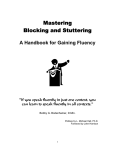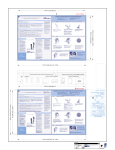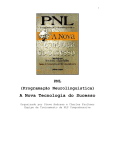Download about hypnosis
Transcript
By Myhrrhleine Answers to your hypnosis question Hello, This book is written to answer some common hypnosis questions. There are many changework methods for the mind. Some are very effective. The purpose of this book is not to take away from their value, just to answer questions specifically about hypnosis. Author’s Note: Hypnosis is a valuable tool. However hypnosis is not a replacement for medical treatment. Hypnosis is best used as an addition to medical services. Never use hypnosis to mask symptoms, treat dis-ease, or make physical changes without the involvement of a licensed Medical Physician. Copyright 2004 Q. What is hypnosis? Q. What is ‘trance’? Q. How is trance different from hypnosis? Q. What is NLP? Q. How is NLP different from hypnosis? Q. Is an Alpha brainwave state hypnosis? Q. Does hypnosis work? Q. Where can I get a tape/CD/MP3 for _____? Q. Should I use "I" or "YOU" when creating a personal self-hypnosis recording? Q. I've heard the mind can't process negatives. Do I need to avoid negatives? Q. Will I lose control? Q. Who can be hypnotised? Q. I wasn't hypnotised. Am I being too resistant? Q. Can a hypnotist make me do _____? Q. Can Hypnosis help me find something I've lost? Q. Can hypnosis help me forget someone/something. Q. Which is better, a towards or an away from strategy? Q. Can hypnosis cure my _____? Q. Then what does hypnosis do? Q. What is the difference between a hypnotist and hypnotherapist? Q. What does hypnosis feel like? Q. How do I find a qualified hypnotist? Q. What is Regression? Q. Why would Regression be used? Q. What is Past Life Regression? Q. What is somnambulism? Q. How many sessions should it take? Q. What is the Esdaile state? Q. What is a hypnotic coma? Q. What is Deep Trance Identification (DTI)? Q. What is Deep Trance? Q. Why is Rapport so important? Q. What is Ericksonian hypnosis? Q. Why do I need a medical referral? Q. Do tapes/CDs work? Q. Can I use self hypnosis for xxx? Q. Where can I get a script for ______? Q. How can I test my patient for hypnosis? Q. Can hypnosis induce feelings like those from Marijuana or alcohol or...? Q. Can I change my appearance with hypnosis? Q. What is stage hypnosis? Q. How does the hypnotist gain such control? Q. How can I learn stage hypnosis? Q. Can hypnosis change me so that... Q. Can hypnosis help me grow taller? Q. Can hypnosis help to make me shorter? Q. Can hypnosis help to change my haircolour? Q. Can hypnosis help to change my eyecolour? Q. Can hypnosis help to make my breasts larger? Q. Can hypnosis help to make my breasts smaller? Q. Can hypnosis help to make my penis bigger? Q. Can hypnosis help to make me thinner? Q. Can hypnosis help to make me fatter? Q. Can hypnosis help me to build muscle? Q. Can hypnosis help to make me become better skilled at...? Q. Can hypnosis help to change my food preferences? Q. Can I learn to enjoy the taste of... or even swallow...? Q. Can hypnosis effect allergies? Q. Can I grow new [limbs/organs/parts]? Chapter 1 Q. What is hypnosis? There are probably as many definitions as there are hypnotists. I define hypnosis like this: The mind has 4 primary ‘filters’ which effect information coming from the senses. 1 filter deletes the sensory input. As vast as the capability of our mind is, there is just more information coming in than we will ever need. Much of the information is deleted before it gets into the mind. 1 filter distorts the information, based on our belief structure. 1 filter generalizes the information for easier processing. 1 filter compares the information with that which is already thought of as fact [critical judgement], and blocks what is believed to be erroneous information. Hypnosis is a bypassing of the 4th filter, the critical judgment filter, and then the establishment of selective suggestibility. Q. What is ‘trance’? Trance covers a wide territory. Anytime your mind is not outwardly focused on your surroundings, it is referred to as a 'trance'. So, if you are daydreaming or engrossed in a movie for instance, it is considered trance. Just about any time you are not paying attention, you are considered by many to be in a state of trance. That means pretty much all the time you are in some sort of a state of 'trance'. Now, any time you are not paying attention (you are in a trance) you are also slightly more susceptible to suggestions. Salesman use this all the time, so do magicians. Since any trance allows you to be more suggestible, it is often used by 'hypnotists'. Q. How is trance different from hypnosis? Hypnosis is a particular trance in which you are many times more suggestible than an average trance because the comparison filter is bypassed. This filter bypassing does not occur in all trances. Q. What is NLP? NLP is a set of tools which can be used to copy or model the behaviour of someone else. NLP's origins are from therapy oriented researchers. Many of the persons first modeled were therapists and so NLP has incorporated many therapeutic techniques. Among those copied was Dr. Milton Erickson and his hypnosis techniques. Q. How is NLP different from hypnosis? NLP (Therapeutic NLP) covers many areas of linguistic changework. It also incorporates the methods of Dr. Erickson's hypnosis styles. But most NLP trainings do not go very deep into hypnosis theory or techniques. NLP also includes some aspects of Gregory Bateson, Fritz Perls, Virginia Satir, and others. NLP also includes some developments by Richard Bandler and John Grinder. NLP uses trance, but NLP trainings seldom teach the bypassing of the critical judgment (4th filter). Q. Is an Alpha brainwave state hypnosis? There is a common confusion that hypnosis is about brainwaves. An error occurred during some university research long ago, and it kinda stuck. The researchers were monitoring brainwaves during hypnosis in order to better understand how hypnosis works. The more common hypnosis methods suggest relaxing. That method was used for the research, and so there were brainwaves showing the person relaxed (predominantly Alpha brainwaves). Since then, some have associated alpha brainwaves with hypnosis and have come up with elaborate methods to induce an alpha brainwave state. Alpha brainwave states are relaxing, and people are more suggestible when they are relaxed, but it isn't hypnosis. Measuring brainwave activity and equating it with hypnosis is like measuring modem activity in an apartment building in Chicago and interpreting what web pages are being viewed in New York. Yes, brainwave monitoring can identify activity, but the technology is just too crude in its current state of the art to identify what the specific brain activity is. Brainwave activity also does not take chemical/hormone communication into account, either inter-cell or intra-cell. Under deep hypnosis, a person can (once taught) create any of the basic brainwave patterns; Alpha, Beta, Delta, etc. That being said, flashing lights isn't hypnosis either , though it might induce an alpha brainwave state. It also might induce seizures (epileptic), so be cautious if you are known to have epileptic seizures. Some people attempt sound waves (binaural) to induce Alpha states. The sound requires a non-linear medium to mix in, so headphones won't work. Additionally, anyone who has actually created those low frequency sounds knows that the intestines and colon spasm around 8 cycles per second (hertz) and things become rather messy. Binaural sounds isn't hypnosis. All trance is not hypnosis. All altered mind states are not hypnosis. Hypnosis is a specific trance. I'm not saying various brainwave states are not pleasant or are not useful or even therapeutic. I'm just saying it isn't hypnosis! Q. Does hypnosis work? Yes. But this assumes you are working with a qualified hypnotist. Tapes/CDs/MP3s are very limited and don't work well. Q. Where can I get a tape/CD/MP3 for _____? Tapes/CDs/MP3s are not a good idea for changework. It can be compared to self-surgery. Listening to an MP3 for a phobia is like following a self-help recording to remove an appendix. But they are fine for general self-improvement. Q. Should I use "I" or "YOU" when creating a personal self-hypnosis recording? It won't matter. Your mind knows your voice and intent. It will accept either equally. Q. I've heard the mind can't process negatives. Do I need to avoid negatives? NO. It's not always necessary. But it is a good idea. Some people do have trouble subconsciously processing negatives. You can check each person to see how they respond to negatives. You can ignore the possibility they might have problems, and hope for the best. You can take the easy way out and get in the habit of not using negative terms. Q. Will I lose control? NO. In hypnosis you are only voluntarily suspending your critical judgment filter. You are still conscious and aware of your surroundings. But if hypnosis couldn't make it easier for you to change, why bother seeing a hypnotist? Q. Who can be hypnotised? Anyone can be hypnotised if the hypnotist is well trained. Hypnosis is just a specific thought. If you can think, you can be hypnotised. The original hypnotisability tests which are often referred to as a reference as to who can be hypnotised were done using a recording for uniformity in the research. Not everyone can be hypnotised by a recorded monotonous voice. Q. I wasn't hypnotised. Am I being too resistant? Probably not. If you have gone to a hypnotist and paid your money, you probably want to be hypnotised, right? The two most common causes of failure are: 1. You have a concern or fear about hypnosis... Maybe a fear of losing control or revealing something you don't want known. Your hypnotist should be able to explain about this and reassure you. 2. The hypnotist lacks the skill needed to be successful (and often blames the client for being resistant). Another possibility is that you were indeed hypnotised, and it just wasn't what you expected. Maybe you expected a certain feeling or experience which wasn't forthcoming. Q. Can a hypnotist make me do _____? Hypnotists may be persuasive, but hypnosis is NOT mind control. Even in stage hypnosis the participants are in control. The stage show participants are chosen because they want to participate and would act out the tasks even without the hypnosis. But if hypnosis couldn't make it easier for you to change, why bother seeing a hypnotist? Q. Can Hypnosis help me find something I've lost? Sometimes yes. If the object was misplaced or dropped, the subconscious mind likely knows where the object is. In that case hypnosis can be very useful in recovering the object. However, if the object has been since moved (by a child, neighbor's dog, etc.) then hypnosis probably won't help. Q. Can hypnosis help me forget someone/something. The short answer is no. A memory can be blocked from conscious recall, but it'll always be there. Using hypnosis to 'forget' or block recall also can create undesired consequences. Someone (a friend or acquaintance) will eventually mention the person/thing that was 'forgotten', but you've forgotten it. You say WHO/WHAT?? with a puzzled look on your face, your friend says, you know the person/thing blah blah blah... This confusion will continue as everyone else remembers, but you don't. It's enough to drive one insane! A better solution is typically to keep the memory in tact, but neutralize the effects or emotions from that memory. Q. Which is better, a towards or an away from strategy? Both have useful places in our lives. A towards strategy gives us direction or a destination. With a towards strategy you will never wander around aimlessly because you know in which direction to go. On the other hand, away from is a powerful motivator. If you accidently place your hand on a hot stove, It doesn't matter so much that you know where you're going to put your hand next. The immediate need is to remove the hand from the stove and do it quickly! Away from is an excellent motivator. Towards gives you direction, but may not sufficiently motivate. In my opinion, the two are best used together. Away from to motivate, and towards to give direction. Q. Can hypnosis cure my _____? No. Hypnosis cannot cure’ anything. Cure is a word which is controlled by the medical establishment. You must be licensed (as a medical physician) to use this word in the same way that Microsoft owns windows. To use windows (as a term in a business) without a license from Microsoft is illegal. For a hypnotist to use cure with reference to the healing arts is illegal unless s/he is also licensed as a physician. Note: Any person can use cure any time they want to. I am referring to Hypnotists not being able to professionally use the term cure without risk of lawsuits or imprisonment. Q. Then what does hypnosis do? The actual changes, whether we call it healing, cure, magic, or whatever the label, comes from within. A doctor may put a cast on a broken arm, but the mind-body team mends the break. Hypnosis enlists that mind-body team to hasten the healing process. Sometimes, there is a faulty decision (deep in our subconscious) to not heal quickly. The hypnotist works with the mind to find what can be done to encourage the mending process. Additionally, certain emotions may hinder healing. Emotions such as hate, anger, envy, bitterness, worthlessness, despair, and such. Hypnosis is a good tool for finding such negative emotions. Often the subject isn't even aware of these emotions, which may have their origins in childhood. Emotions, all emotions have some value, but sometimes they can interfere with health or healing. When such emotions are dealt with, healing often occurs. Q. What is the difference between a hypnotist and hypnotherapist? The terms are sometimes used interchangeably. A Hypnotist is someone who is skilled at using hypnosis. A hypnotherapist is someone who applies their hypnosis skills for therapeutic purposes. Being a hypnotist does not guarantee skills in therapy, but a hypnotherapist may be a therapist who occasionally uses hypnosis. Being a hypnotherapist is no assurance the therapist has any significant hypnosis skills. In many places, in order to use the term therapy, such as in hypnotherapy you must be a licensed therapist. A therapist may or may not have hypnosis skills. So, the practitioner describes him/her self as a hypnotist in order to obey the laws . Q. What does hypnosis feel like? Hypnosis for therapy often doesn't feel much different than just sitting there. You will normally be more relaxed, but relaxation is not required for hypnosis. Most hypnotherapists use relaxation. After all, isn't it nice to relax and feel at ease? During the session, your senses are usually heightened. Therefore you will typically be more aware of what is going on all around you. A good hypnotist will suggest you listen to her voice and just allow the other sounds to help you relax, rather than the sounds be a distraction. A good hypnotist will also do little tests along the way. The tests are only to help you know that you are hypnotised and you can be confident of the hypnosis. I referred to hypnosis for therapy because there are other kinds of hypnosis. Stage hypnosis would feel different. Hypnosis for Stage In stage hypnosis you do not necessarily sit in a chair and relax. It doesn't feel special or different. For Emergency hypnosis, such as a leg amputation or for a burn victim, there may be no special feeling of hypnosis, there certainly isn't a need for relaxation, just relief from the pain. Q. How do I find a qualified hypnotist? A title or letters behind the name does not qualify a hypnotist. Finding a good hypnotist is more difficult than finding a good auto-mechanic. There is no standardized testing for hypnotists. I recommend that you start with your phone book. Contact the hypnotists and ask them if they have ever worked with your issue. Ask for references, others who have been helped with your issues. Q. What is Regression? Regression is merely a tool for enhancing our memory/recall of past events. Q. Why would Regression be used? The choices our mind makes is based on our belief structure. Our beliefs, in turn, are built from our past experiences and associated emotions. If there is an easily identified belief which needs to change (such as a belief: I am a failure) then that belief can be easily addressed. Sometimes though, beliefs are built one upon the other, or several beliefs from one life experience. In this case it can be hard to sort them all out for change. A regression is a tool for virtually reliving an experience in your mind. The hypnotist may 'reframe' the event, or give you a new understanding of the event which you may not have been able to understand at the time. With the new knowledge or understanding for the event, your mind may now make new decisions based on the new understanding of the event. Your mind may now identify and rebuild the entire belief structure based on its new understanding. The hypnotist should not start with the assumption that a regression is necessary. Q. What is Past Life Regression? Some people seem to ‘remember’ the past beyond their own birth, as if they have lived in a previous life as another person. Often, the memories are just fantasies of the subconscious mind. Occasionally, the memories are too accurate to explain as a fantasy. Sometimes, the subconscious believes a past event is the cause of a dis-ease. Just becoming aware of the past life event may be enough to allow healing. A good hypnotist does not suggest that the issue is from a past life and the patient should not seek anything from a past life, except recreationally. If the hypnotist starts by saying your issue is likely caused by a past life, that hypnotist should be avoided. In fact, if the hypnotist claims to know the cause, whatever s/he believes it to be, s/he is likely wrong and another hypnotist should be sought. If the patient's sub-conscious believes it is a past life issue, so be it. But the hypnotist should not have presuppositions about your issue and should not suggest anything as a possibility but should allow the sub-conscious to reveal the real issue. A hypnotist may have a pretty good idea of the cause, but a good hypnotist will leave her preconceived ideas outside the office. Q. What is somnambulism? Somnambulism is a particular hypnotic state where you are significantly more suggestible. Somnambulism is the state where you will completely and readily accept a suggestion of anesthesia or amnesia. Somnambulism then is a good state for surgery. There are some people who claim all trance is the same, and the trance of driving a car is just as good as somnambulism. But I doubt you would want an appendix removed with just the level of trance you get from driving in a car... ouch! If all trance were equally effective, surgeons would just use TV in the operating rooms instead of anesthesiologists. With somnambulism, you are about 100 times more suggestible than when you are in the lighter trance states. Somnambulism is the lightest state I recommend for hypnosis. Somnambulism is also the state where you readily accept suggestions of hallucination. Achieving somnambulism in a subject should take one minute or less. The commonly used progressive relaxation methods of inducing hypnosis often never achieve somnambulism. Q. How many sessions should it take? This will vary depending on the presented issue. For habits such as nailbiting, typically one or two sessions is enough. For smoking or basic pain relief, 4 sessions is not unreasonable. Your hypnotist should go over this with you up front. If s/he claims more than 8 sessions will be needed, then you should seek out a hypnotist with greater skill or experience unless you are seeking a hypnotist for issues such as cancer, diabetes, ALS and such. Then 10-12 sessions is not unreasonable. Q. What is the Esdaile state? James Esdaile MD used a state of hypnosis which allowed anesthesia without suggestion. The Esdaile state is any hypnotic state which provides total anesthesia (usable for surgery) without suggestion. Q. What is a hypnotic coma? A misunderstanding of the Esdaile state. The Esdaile state is incredibly pleasant. In the Esdaile state, you really don't care about what is going on around you. You are totally aware, you are just feeling so good you don't care about what is going on around you physically. Should a medical expert test you, you would exhibit signs of a medical coma. You would be totally non-responsive to outside stimulus, even injury. Thus this state is excellent for surgery because you don't notice the discomfort of being cut or operated on. In this state, your pupils are dilated and you seem for all practical purposes to be in a coma, hence the name. But this is just the incredibly pleasant Esdaile state and no cause for alarm. Q. What is Deep Trance Identification (DTI)? DTI is a hypnotic tool where the hypnotic subject is encouraged to believe that s/he is someone or something else. It is a useful method to teach with and to take on the characteristics of another completely in order gain deeper insight. Q. What is Deep Trance? Hypnotic trance has historically been defined by trance 'levels'. Waking trance is when suggestions are given while you are totally alert and conscious. Lighter trance is characterized as distractions, such as when you're driving a car and miss an exit. Deep trance begins at Somnambulism and extends through the Esdaile state. While Somnambulism is a Deep Trance, it is relatively light with regard to hypnosis Very deep trance begins just beyond the Esdaile state. Q. Why is Rapport so important? Rapport is a feeling or response of comfort or trust in another individual. The greater the confidence or trust in your hypnotist, the better. Rapport is critical for relaxation style of ‘hypnosis’. With relaxation (often mistakenly referred to as Ericksonian style hypnosis) the depth of trance is usually not tested and is unknown. Since the critical factor filter may not be bypassed, it is important to have the subconscious comfortable with the hypnotist’s suggestions. This requires a fairly deep rapport. When somnambulism is achieved, the critical factor is bypassed and it therefore does not filter the suggestions. In this case the only rapport needed is the rapport of the subject who is willing to come see the hypnotist and pay for services. Q. What is Ericksonian hypnosis? Ericksonian hypnosis is patterned after the works of Dr. Milton Erickson MD. The late Dr. Erickson is considered by many to be among the greatest hypnotists who ever lived. Most of the methods Dr. Erickson utilised were developed by Dr. Erickson himself over the years. Many hypnotists today claim to be trained in his style. Q. Why do I need a medical referral? Hypnotists are generally not licensed doctors. The legal system in most countries require that a hypnotist not work with any diagnosed ailment unless supervised by a licensed physician. A referral indicates you have a physicians approval to see a hypnotist for the specific issue of the referral. Q. Do tapes/CDs work? Tapes or CDs are limited in effectiveness. They are not useless, just less effective than a live hypnotist. Often CDs are very limited. There are a couple of points at issue with tapes/CDs. 1. The recording is generalised for the population as a whole and will not induce a deep trance in most people. 2. The suggestions are generalised and may or may not be applicable to the individual’s needs. Q. Can I use self hypnosis for xxx? Self hypnosis is great for self-improvement. But I cannot recommend it to help with problems. It's like asking about self-medication. It's like asking 'can you write me a prescription for a drug to fix my xxxx' or like asking for a how-to tape for appendix removal. While I'd like to give a simple 'do-this' answer, it's dangerous for your health. If you have an issue, you should seek out skilled help. If you only seek self-improvement, hypnosis is a great tool. Q. Where can I get a script for ______? Please be aware that scripts have very little therapeutic value. Scripts should never be read to a patient. Scripts do have a value as a learning tool though. I do not have scripts that I have written available to share, but a web search should reveal many scripts. Q. How can I test my patient for hypnosis? Tell the person "I'd like you to look into my eyes please" [so you can see their eye's pupils.] Say: "I'm going to count from one to three. On the count of three I will snap my fingers. When my fingers snap, the lights will go out, and it will be totally dark in this room. one... two... three... " [snap]. If your client is hypnotised, their pupils will enlarge because it is now dark. Q. Can hypnosis induce feelings like those from Marijuana or alcohol or...? Yes. Or you can create new sensations like perhaps mixing the pleasures of orgasm with the rush of skydiving. Creating new feelings is best. That way you can avoid any possibility of accidently inducing drug side-effects which you may not want and just enjoy the good feelings. I most often simply teach people to go to the Esdaile state. It is quite Euphoric and better than most drug feelings. Q. Can I change my appearance with hypnosis? Yes, Especially changes in the soft tissues. Q. What is stage hypnosis? Stage hypnosis is an application of hypnosis for entertainment. Q. How does the hypnotist gain such control? S/he doesn’t have ‘control’ over the individual. The people are all volunteers and choose whether to do the particular stunt. Hypnosis is used to allow the person to be more at ease with their actions on stage. Q. How can I learn stage hypnosis? Study basic hypnosis first, then learn how to perform and entertain on stage. Next, get the books: The New Encyclopedia of Stage Hypnotism by Ormond McGill and DEEPER AND DEEPER by Jon Chase Chapter 2 Q. Can hypnosis change me so that... Sometimes. It really depends on what you wish to change. Some things can be changed, other things cannot be changed. Sometimes the answer is unknown, having not been well tested. Physical body change is controversial. Some hypnotists don't believe it's possible. Some don't know. Many have strong beliefs one way or the other. This book is written to share possibilities. It does not suggest a given hypnotist will have the needed skills, experience, and/or training. Note: ALWAYS work with a medical doctor for hypnosis which involves healing, symptom relief, or physical changes! Hypnosis should be an adjunct and not a replacement for medical services. Q. Can hypnosis help me grow taller? At a certain age, different for each person, our bone ends fuse to prevent further growth. While you are young, hypnosis may be able to enhance your growth. After your bones fuse, growth may not be possible. I say may because the possible side effects of growth after bone fusing is enough to discourage most hypnotists from trying. Determining this possibility would require experimentation on human subjects. Q. Can hypnosis help to make me shorter? At a certain age, different for each person, our bone ends fuse, to prevent further growth changes. While you are young, hypnosis may enhance your growth, taller or remaining shorter. After your bones fuse, growth change may not be possible. I say may because the possible side effects of changes after bone fusing is enough to discourage most hypnotists from trying. Determining this possibility would require experimentation on human subjects. Q. Can hypnosis help to change my haircolour? Our haircolour often changes naturally through our lifetimes. Hypnosis can often be used to effect change in a person's haircolour to another biologically natural colour for that person. If your hair was blonde when young, but is darker now, then returning to that lighter colour is often possible. Q. Can hypnosis help to change my eyecolour? As with haircolour, limited change is sometimes possible. Q. Can hypnosis help to make my breasts larger? Typically, yes. Breasts naturally change size. Even from week to week there is often some small changes. Q. Can hypnosis help to make my breasts smaller? Often, yes. Breasts naturally change size. Even from week to week there is often some small changes. Q. Can hypnosis help to make my penis bigger? Most soft tissue can be changed with hypnosis. Q. Can hypnosis help to make me thinner? Hypnosis for weightloss is common. Q. Can hypnosis help to make me fatter? Typically, yes Q. Can hypnosis help me to build muscle? Typically, yes Q. Can hypnosis help to make me become better skilled at...? Hypnosis is a valuable learning tool. There are techniques for accelerated learning with hypnosis. Q. Can hypnosis help to change my food preferences? Typically, yes. Q. Can I learn to enjoy the taste of... or even swallow...? Yes. Hypnosis can assist in your learning to enjoy new, exotic foods and flavours. Either by suggesting the taste is enjoyable, or suggesting a different taste is experienced. A popular stage act is to hand a person an onion and suggest it is a delicious apple. Q. Can hypnosis effect allergies? Often, yes. Be sure that your MD is involved for any allergy issues. Q. Can I grow new [limbs/organs/parts]? This is an interesting area for which I don't have a good answer. I know of research going on to test if this is possible, using stem cells. I have not heard of positive results yet. Stem cells can be found in abundance in adults. Appendix Q. What are some good hypnosis books? These books give a basic range of views on hypnosis and hypnotic applications. Some of them even contradict me. I do not endorse all of them, but I recommend there reading so that you may have a variety of thoughts: ANSWER CANCER by Stephen Parkhill HYPNOSIS AND HYPNOTHERAPY BASIC TO ADVANCED TECHNIQUES FOR THE PROFESSIONAL by Calvin Banyan and Gerald Kein HYPNOSIS : A COMPREHENSIVE GUIDE by Tad James HYPNOTHERAPY by Dave Elman THE ART OF HYPNOSIS: MASTERING BASIC TECHNIQUES by C. Roy Hunter HYPNOSIS: THE INDUCTION OF CONVICTION by John Hugh HYPNOTISM TODAY by LeCron & Bordeaux HYPNOTHERAPY HANDBOOK: HYPNOSIS AND MINDBODY HEALING IN THE 21ST CENTURY by Kevin L. Hogan PSYCHOBIOLOGY OF MIND BODY HEALING : New Concepts of Therapeutic Hypnosis by Ernest Rossi PSYCHOBIOLOGY OF GENE EXPRESSION by Ernest Rossi REGRESSION HYPNOTHERAPY by Randal Churchill REFRAMING: NEURO-LINGUISTIC PROGRAMMING AND THE TRANSFORMATION OF MEANING by John Grinder and Richard Bandler THERAPEUTIC TRANCES by Stephen Gilligan TINNITUS: TURNING THE VOLUME DOWN by Kevin L. Hogan TRANCE ON TRIAL (Guilford Clinical and Experimental Hypnosis Series) by Alan W. Scheflin, Jerrold Lee Shapiro TRAINING TRANCES by John Overdurf and Julie Silverthorn. TRANSFORMING THERAPY, A NEW APPROACH TO HYPNOTHERAPY by Gil Boyne TRANCE-FORMATION Neuro-Linguistic Programming and the Structure of Hypnosis by John Grinder and Richard Bandler TRANCEWORK: AN INTRODUCTION TO THE PRACTICE OF CLINICAL HYPNOSIS by Michael D. Yapko Q. What are some good NLP books? CHANGE YOUR MIND-AND KEEP THE CHANGE : Advanced NLP Submodalities Interventions by Connirae. Andreas, Steve Andreas CORE TRANSFORMATION by Connirae Andreas, Tamara Andreas FROGS INTO PRINCES by John Grinder, Richard Bandler HEART OF THE MIND by Connirae Andreas, Steve Andreas (Contributor) REFRAMING Neuro-Linguistic Programming and the Transformation of Meaning by Richard Bandler SLEIGHT OF MOUTH : The Magic of Conversational Belief Change by Robert Dilts STRUCTURE OF MAGIC A Book About Language and Therapy by Richard Bandler, John Grinder STRUCTURE OF MAGIC A Book About Communication and Change by Richard Bandler, John Grinder TIME FOR A CHANGE by Richard Bandler TIMELINE THERAPY AND THE BASIS OF PERSONALITY by Tad James, Wyatt Woodsmall TRANCEFORMATIONS by John Grinder, Richard Bandler USING YOUR BRAIN FOR A CHANGE by Richard Bandler THE USER'S MANUAL FOR THE BRAIN by Bob Bodenhamer, Michael Hall Some of these books are expensive and some are out of print, so they may not be readily available. Your library may not have these books on their shelves. Interestingly, libraries usually cooperate among themselves offering something called an 'inter-library' loan. Ask your local library about this. You may need to ask a librarian, or even the 'help desk'. If your library doesn't have the book, ask if they can borrow the book from another library for you.


















































